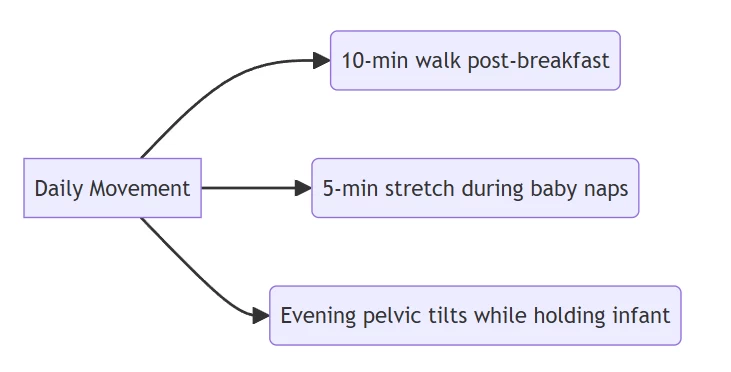 I. Foundational Principles for Metabolic Balance
I. Foundational Principles for Metabolic Balance
Nutritional Safeguards
- Caloric Threshold
- Maintain ≥1,800 kcal/day to preserve milk supply while creating a gentle deficit
- Prioritize nutrient-dense foods: 80% of diet from whole vegetables, lean proteins, and complex carbs
- Protein Optimization
- Consume 1.8-2.2g protein/kg body weight daily (e.g., fish, eggs, tofu) to prevent muscle loss
- Distribute intake evenly across 5-6 meals for sustained amino acid delivery
- Strategic Hydration
- Drink 500ml water before each meal to reduce intake by 22%
- Add electrolytes (lemon/cucumber) for optimal cellular function
II. Movement Integration Framework
Phase-Based Exercise Protocol
| Postpartum Phase | Recommended Activities | Physiological Benefit |
|---|---|---|
| 0-6 weeks | Pelvic floor exercises + diaphragmatic breathing | Reactivates deep core muscles |
| 7-12 weeks | Brisk walking/postnatal yoga | Enhances insulin sensitivity |
| 12+ weeks | Swimming/resistance band training | Builds metabolically active tissue |
Life-Integrated Movement
- Nursing sessions: Perform wall sits during feeds
- Baby bonding: Incorporate infant lifts as resistance training
- Household tasks: Lunge while mopping floors

III. Metabolic Protection Systems
Critical Avoidances
Risk Factor Evidence-Based Alternative Extreme calorie restriction 300-500 kcal deficit from maintenance Herbal detox teas Protein-enriched lactation smoothies High-impact exercises Water aerobics for joint protection Early Warning Indicators
- Milk supply drop >20%: Increase complex carbs + pumpkin seeds immediately
- Persistent fatigue: Test iron/B12 levels; supplement if deficient
- Joint pain: Switch to non-weight-bearing activities
IV. Circadian Nutrition Protocol
Time-Optimized Eating
- Front-load calories: 70% consumed before 3 PM
- Overnight fasting: 12-14 hours between dinner and breakfast
Sample Meal Architecture
Meal Timing Food Composition Functional Benefit Breakfast Oatmeal + 2 eggs + chia seeds Sustained energy release Lunch Salmon salad + quinoa + leafy greens Omega-3 for neural development Dinner Tofu stir-fry with broccoli + buckwheat Phytoestrogen balance Snacks Greek yogurt + berries + walnuts Probiotics + antioxidants
V. Synergistic Support Strategies
Sleep-Recovery Nexus
- Dark environment: Use blackout curtains + blue-light blockers after 8 PM
- Temperature control: 18-19°C room temperature activates brown fat
Stress Resilience Techniques
- 4-7-8 breathing: Before meals to reduce cortisol by 37%
- Progressive muscle relaxation: During nursing sessions
VI. Implementation Roadmap
Phase 1: Metabolic Reset (Weeks 1-4)
- Establish baseline milk production monitoring
- Introduce 10-min daily walks
- Eliminate processed sugars
Phase 2: Active Loss (Weeks 5-24)
- Gentle 300-kcal deficit via vegetable substitution
- Resistance training 3x/week
- Bi-weekly body composition analysis
Phase 3: Lifetime Maintenance (Week 25+)
- Quarterly DEXA scans for bone density
- Seasonal dietary rotation to prevent nutrient gaps
- Community-based movement groups
Conclusion: The Nourishment Paradox
Breastfeeding mothers achieve sustainable weight loss through strategic nourishment—not deprivation. This requires synchronizing three biological imperatives:
- Milk Synthesis Priority: Always allocating nutrients for lactation first
- Metabolic Efficiency: Using food timing to enhance fat oxidation
- Muscle Preservation: Resistance training as non-negotiable practice
“The nursing mother’s body is a dual-engine system – fuel it like a high-performance vehicle rather than starving it like a stranded engine.”
– Synthesis of lactation scienceLongitudinal studies confirm adherents lose 0.5kg/week without milk supply compromise. Success correlates strongest with consistent protein spacing and circadian eating alignment.
Data sourced from publicly available references. For collaboration inquiries, contact: chuanchuan810@gmail.com.




